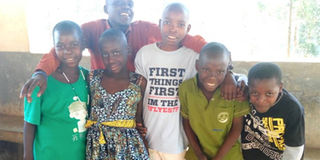From the streets to HIV youth ambassador

Ngambenawe with some of the youth he counsels. He encourages youth to live responsibly after testing HIV positive so that they do not spread the virus. courtsey PHOTO
What you need to know:
Peter Ngambenawe started falling sick at a young age and when he was diagnosed with HIV, he faced one challenge after another. However, through resilience and hard work, he was able to put himself through school and cease opportunities that came his way. Now a counsellor, he uses this position to encourage other young people living positively to never give up.
Peter Ngambenawe, 22, was born on December 10, 1997 in Kirwa Village, Kijuguta Ward, Kabale municipality. His parents separated before he was born and after two months, his mother left him with his great grandmother.
At one and half years, Ngambenawe fell ill and after several tests, Ngambenawe was diagnosed with Tuberclosis (TB), which kept him admitted in hospital for almost 10 months. He then faced multiple illnesses such as malaria, fever, rashes and diarrhoea that attacked and weakened his immune system. At three years, he tested HIV positive and was put on septrine tablets.
Stigma
Ngambenawe’s great grandmother could not afford to take him to school. She, therefore, registered with a Catholic vulnerable people project in Kabale and through them, she would get money to pay his school dues. However, in Primary Four, the money stopped coming since the organisation claimed that his great grandmother was a drunkard.
Ngambenawe says he faced a lot of stigma from the people in his village as well as school. He recalls a time when he had a wound on his leg that took so long to heal. “One time while at a shop, a hen pecked at my wound as I waited. The owner killed it and threw it away for fear of catching HIV,” he says.
At eight, he had a TB relapse, his skin rash resurfaced and the CD4 count was very high so he was started on ARVs in 2005. He had stopped going to school for about two years and because he constantly fell ill, his great grandmother’s children sent him away from home.
On the streets
However, since he had nowhere to go, Ngambenawe would try to sneak into his grandmother’s house but would find the door closed. Sometimes he would sleep in the granary and ensure he left so early before everyone woke up. “Alternatively, I would go to cinema halls around Kabale Town where I offered to clean and would be allowed to watch the movies but would actually sleep there,” he says.
Eventually, he had nowhere to go but stay on the streets. In search for what eat, there is a common place for street children near Hotloaf Bakery in Kabale Town where they dispose of stale and damaged bread so Ngambenawe joined the children there.
“Sometimes, I offered to carry garbage from restaurants in Kabale Town and the owners would give me leftover food. Others would give me money which I used to buy food so that I ate a balanced diet to sustain my ARV intake. I would get my ARVs from Kabale Regional Referral Hospital.
Going back to school
During the weekend, there were people from Elizabeth Glazer Pediatric Aids Foundation (EGPAF) who offered food, soda and entertainment. I admired so much the people who worked with the organisation since they would speak English.
The volunteers from EGPAF would give counselling services and Ngambenawe attributes his inspiration to go back to school to them because they kept telling him and other street children who came to eat food that school was important.
He then embarked on searching for old metals (commonly known as scrap) and would sell them to get money. Also, he went to Hotloaf Bakery where he would work from 6am to 10pm and would be paid between Shs1,500 and Shs2,000. The work involved packing buns, washing trays and carrying ingredients from the store to wherever they were needed.
“I needed about Shs20,000 per term and when I got the money, I joined school again. During the Presidential Initiative on AIDS Strategy to Youth (PIASCY) lessons, teachers would use me as an example whenever they talked about HIV but I did not care because all I wanted was to study and be a better person,” he recalls.
Challenges
However, Ngambenawe says sometimes he would miss school because he was washing bicycles, motorbikes and cars to get money for food and school fees.
“At 15, I sat my Primary Leaving Examinations. I waited two years to join secondary school because I was unable to raise the school fees. I went back to the place I called home and luckily, I was accepted but they emphasised that they would only provide shelter.”
Through hard work, I was able to join secondary school, continued going to the EGPAF counselling sessions and they gave me a lot of parental guidance. Fortunately, when the head teacher of the school found out about his situation, she offered to pay part of his school fees if he accepted to work at her farm and do house chores.
After Senior Four, during one of the Elizabeth Glaser Pediatric AIDS Foundation counselling sessions, a white man named Ian offered to sponsor Ngambenawe for a short course in counselling alcohol, addictions and drug abuse victims. In another project by EGPAF, he trained as a peer educator.
After the training, he was recruited to work as a volunteer at Kabale Hospital, where he counselled adolescents on positive living, which he has done for three years.
Currently, Ngambenawe is also an Ariel Ambassador, giving psychosocial support to youth living positively in all health facilities supported by EGPAF in Southwestern Uganda.




